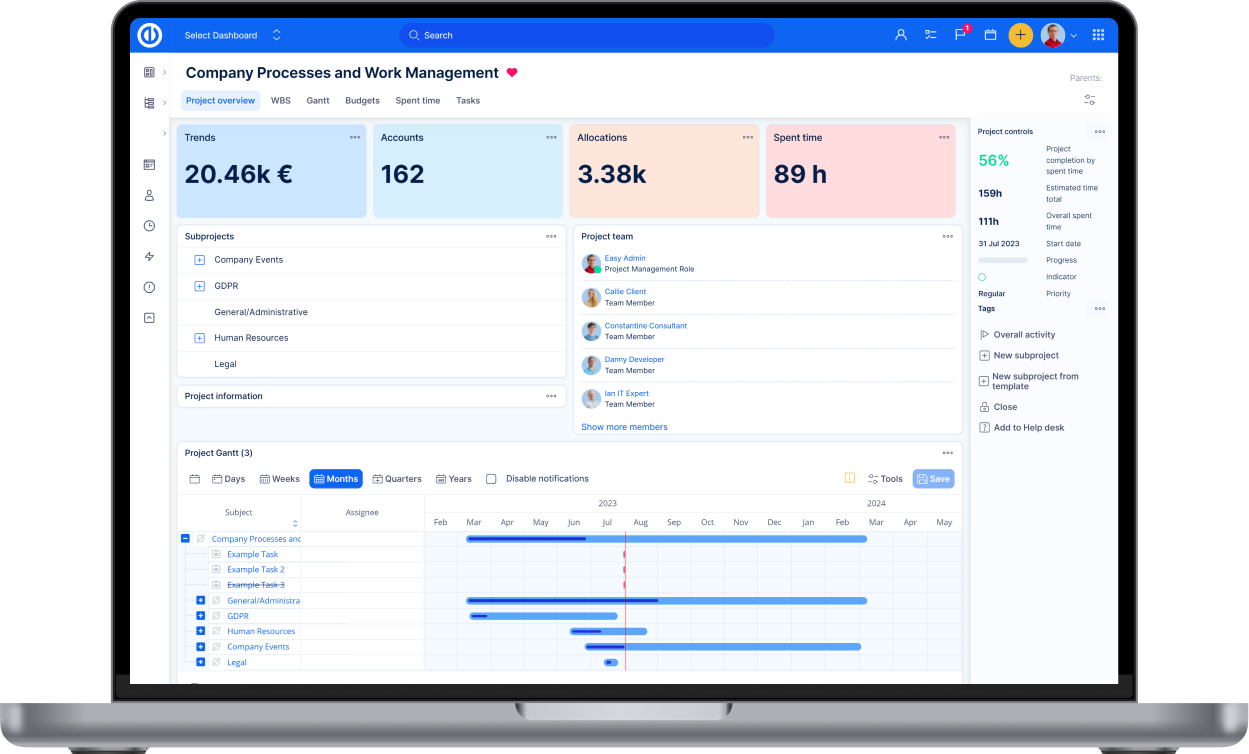Why Excel and PowerPoint aren’t enough for project management: Especially in medical manufacturing
While Excel and PowerPoint are useful for various purposes, they are not equipped to handle the complexities of managing projects in medical manufacturing. Looking for a solution? The answer is in the lines below.

Table of contents
Excel and PowerPoint are holding your project management back
1. The complexity of medical manufacturing projects
2. Lack of real-time collaboration and visibility
3. Compliance and regulatory requirements for medical manufacturing
4. Task tracking and accountability
5. Need for integration with other business tools
6. Scaling for future growth
Prooved importance of implementing project management software
Excel and PowerPoint are holding your project management back
In the highly regulated world of medical manufacturing, efficient project management is essential to maintain product quality, meet deadlines, and comply with strict industry regulations. However, many organizations still rely on outdated tools like Excel and PowerPoint to track and manage their operations, despite these tools' inherent limitations.
I have listed 6 reasons why leaders in this industry cannot rely on Excel spreadsheets and outdated slides in PowerPoint:
1. The complexity of medical manufacturing projects
While useful for organizing data in tables, Excel lacks the functionality to track complex workflows or integrate with other business tools used in medical manufacturing. When relying on rows and columns, it’s easy to lose track of dependencies, updates, and progress. Moreover, Excel spreadsheets are prone to human error, whether due to incorrect formulas, version control issues, or mismatched data.
PowerPoint, on the other hand, is designed for presentations, not project management. It doesn’t provide any meaningful way to track tasks, milestones, or assign responsibilities, making it impractical for the day-to-day management of manufacturing projects.
2. Lack of real-time collaboration and visibility
One of the key challenges in medical manufacturing is the need for real-time collaboration and visibility. Teams need access to up-to-date information to make informed decisions quickly.
With Excel and PowerPoint, sharing and updating files can be time-consuming and error-prone. Often, one team member may update a file and send it to another, only for the second person to make changes to an outdated version. This can result in confusion, miscommunication, and delays.
Dedicated project management software, on the other hand, offers centralized platforms where all team members can view and edit tasks, timelines, and project statuses in real time. These tools allow for version control, ensuring that everyone is working off the most current data. Team members can also communicate directly within the platform, streamlining collaboration and reducing the risk of mistakes.
3. Compliance and regulatory requirements for medical manufacturing
Compliance with regulations such as Good Manufacturing Practices (GMP), ISO standards, and FDA requirements is paramount to ensure product safety and quality. The European Union's regulatory framework for medical devices is governed primarily by the Medical Device Regulation (MDR) 2017/745 and the In Vitro Diagnostic Regulation (IVDR) 2017/746, which replaced earlier directives to enhance safety, transparency, and post-market oversight.
Keeping track of compliance records, documentation, approvals, and certifications manually in Excel is not only inefficient but also risky. It simply cannot provide the audit trails, reminders, or automated checks that help ensure compliance.
The solution is well-chosen project management software that offers built-in compliance tracking, alerting team members to upcoming audits, approvals, or certifications that are required. Additionally, such platforms often include features that maintain detailed audit trails, documenting every action taken within the system for regulatory purposes. This streamlines compliance efforts and provides peace of mind when it comes to audit preparation.
4. Task tracking and accountability
In medical manufacturing, accountability is critical. It’s important to know who is responsible for each task and whether the task is on track to be completed on time. Excel can be used for basic task tracking, but it doesn’t offer sophisticated project management features like task dependencies, automated reminders, or progress tracking.
PowerPoint isn’t suited for task tracking at all, as it’s primarily a presentation tool. In the context of project management, it’s unlikely that the slide deck will reflect the latest changes, deadlines, or assignments, which can result in missed tasks or forgotten deadlines.
In contrast, modern project management tools offer task assignment features, where every team member is clear on their responsibilities. These all-in-one platforms allow for task dependencies, so team members can track how one task impacts the next. They also provide real-time notifications and reminders, ensuring that important deadlines are met. This helps improve accountability and keeps everyone on track.
5. Need for integration with other business tools
In medical manufacturing, project management is just one piece of the puzzle. Teams also need to integrate their work management systems with other tools like inventory management, enterprise resource planning (ERP) systems, quality control systems, and supply chain software. Excel and PowerPoint are not equipped for this type of integration, which can lead to isolated data sets, errors, and inefficiencies.
Modern project management software often integrates seamlessly with other business tools, allowing for better data sharing and coordination across departments. For example, inventory levels can be automatically updated based on project progress, or quality control results can be tracked within the same system, giving teams a complete overview of the project’s status in real-time.
6. Scaling for future growth
As medical manufacturing companies grow, so do the complexities of their projects. Relying on Excel or PowerPoint makes it difficult to scale operations, as these tools are not designed to handle large amounts of data or complex project structures. Additionally, the lack of automation means that as the company grows, the amount of manual work required increases, leading to more opportunities for errors and delays.
To scale with your business, and handle an increasing number of tasks, users, and projects, project management software will provide you with the tools you need to manage larger, more intricate projects without compromising quality or efficiency.
Prooved importance of implementing project management software
While Excel and PowerPoint may have their place in certain aspects of your work, when it comes to managing projects in medical manufacturing, the right project management software is indispensable.
By implementing project management software, the company will gain a centralized, collaborative platform for managing projects. It allows for real-time tracking, improved visibility, and compliance, helping teams stay on top of tasks and deadlines. By embracing the right software, medical manufacturers can streamline their operations, reduce errors, and position themselves for future growth in a highly regulated industry.
Try Easy Redmine, project management software, for 30 days for free to ensure efficiency, compliance, and accountability!



